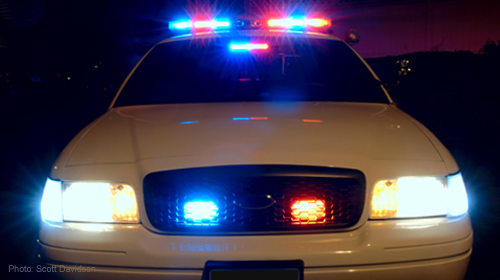
It is every citizen's right to videotape police activity in public spaces so long as they do not interfere with law enforcement. When the police act unlawfully, one might even say capturing that behavior on film is every citizen's duty. Apparently the Memphis Police Department didn't get that memo.
Instead, the MPD has been using excessive force against volunteers and hip hop fans. And when these Memphis citizens have tried to exercise their right to record abusive police practices, MDP officers snatch the offending cellphones. To top it off, they then put the person in handcuffs, level patently bogus charges like "disorderly conduct" or "obstructing a passageway," and force the person to spend hours in jail before the charges are thrown out.
On Friday night, in downtown Memphis. One of the concert attendees took out his phone to film the police. An officer seized his phone, threw him in the back of a squad car, and – according to the fan – said :
You little art kid, you think you are so cool, you videotaped and you think you are going to be on YouTube, well, were going to take you to 201 (the jail) and you'll see what this is really about, you won't be so happy after that.
Why were these officers so concerned about their tactics being caught on camera? What exactly are they trying to hide?
Maybe what many any observers claimed was excessive force used to break up a recurring, public hip hop performance. Video from other sources shows that officers went the friend to whom this fan tried to pass his phone as police arrested him.
The whole incident ended with police attempting to whitewash their misconduct by charging the fan with .
This was not an isolated incident. In addition to spending time and energy going after "little art kids," the MPD has also been cracking down on volunteers. Take for example that occurred at Manna House, a House of Hospitality for people experiencing homelessness. On October 21, MPD officers came to Manna House claiming they were looking for a suspect. A Manna volunteer approached the officers before they entered the property. On the public sidewalk outside of the house, she explained that Manna House sought to provide a safe space for the homeless. Therefore, under Manna's policy the officers could not come inside the privately-owned building without a warrant unless there was an emergency. That also happens to be basic Fourth Amendment law, but apparently the MPD did not get that memo either.
When the officers refused to produce a warrant or offer any other justification for their presence, the volunteer began filming. One officer responded by claiming the volunteer needed a permit to film. In case you were wondering, that's absolutely false. When the volunteer refused to stop filming, the officers took her cellphone, placed her in handcuffs, and arrested her for obstructing a passageway, which apparently in Memphis means standing on a sidewalk to record MPD officers attempting an illegal search. Soon after the volunteer was arrested, a local organizer arrived, began filming, and asked that the officers identify themselves. In short order, the officers grabbed his phone, handcuffed and arrested him for obstructing a passageway, and, presumably for asking the officers who they were, tacked on a disorderly conduct charge for good measure.
Though all charges were eventually dropped and the cellphones returned, what both the volunteer and the organizer can never get back is the for doing exactly what the Constitution allows them to do.
It seems the Memphis Police Department has a problem on its hands of Constitutional proportions. Police Director Armstrong that "we don't have any policy that says we address citizens when they're filming." He is meeting this week with his legal advisor to develop an appropriate policy. We encourage this effort and hope it ultimately ends the MPD's targeting of those who try to film them. However, Director Toney should also pay some attention to what his officers were trying to hide: the use of excessive force to break up peaceful assemblies, the intimidation of private citizens to conduct unauthorized searches, and the fabrication of false charges in order to jail those who dare defend their rights. These activities all indicate the department suffers from a dysfunction much deeper than camera shyness.
Learn more about police practices and other civil liberty issues: Sign up for breaking news alerts,, and .


